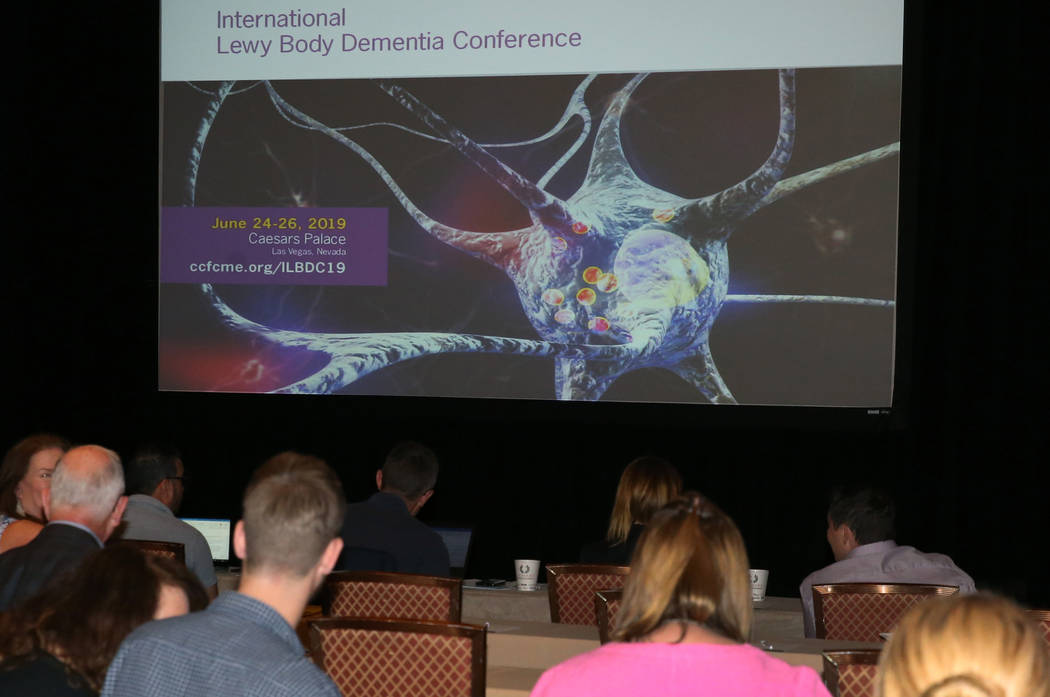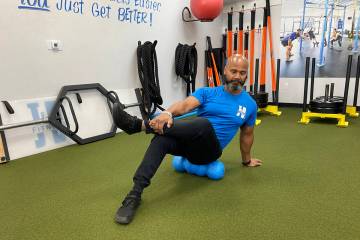Robin Williams’ widow talks of the couple’s struggle at Las Vegas conference
An international health conference opened Monday with the story of the battle a beloved actor fought with a ferociously unlovable disease.
Susan Schneider Williams, widow of Robin Williams, told doctors, researchers and family members attending the International Lewy Body Dementia Conference about the couple’s struggle with the neurological disease.
More than 300 people from around the world were scheduled to attend the conference at Caesars Palace. Researchers, physicians and medical professionals will hear the latest research, while family members and caregivers were attending a separate track of workshops and informational sessions.
According to the Cleveland Clinic — which, with its Lou Ruvo Center for Brain Health, is presenting the conference — Lewy body dementia is caused by an accumulation of proteins in neurons that can cause mental, cognition and movement deficits, hallucinations, and severe anxiety and depression.
LBD is one of the most common causes of dementia in elderly patients, the clinic says, and as many as 1.4 million people in the United States live with it.
The cause of LBD is “not exactly known,” said Dr. James Leverenz, the Cleveland-based conference director. “It’s more common than people think, and I think physicians and clinicians are getting better at diagnosing it and recognizing its unique features.”
Robin Williams, the Oscar-winning actor and comedian, took his life in 2014 at age 63. His widow shared their story at the opening presentation of the conference, recalling how they met at a Northern California computer store and married in 2011.
“We finally found what we both had been looking for: Unconditional love, honor and respect, and a trusted friend and partner,” she said.
Then, in fall 2013, “Robin started suffering symptoms from a disease he would never know the name of: Lewy body dementia.”
Williams had already spent several months dealing with a raft of seemingly unconnected ills. Then came an episode of severe abdominal discomfort. A test for diverticulitis came back negative.
“The pain subsided, but what was alarming was Robin’s reaction to it all. He had a sudden and sustained spike in fear and anxiety unlike anything I’ve ever seen before,” she said.
“That was totally out of character. What I know now is he was exhibiting a notable hallmark of LBD: New onset anxiety sustained.”
LBD has more than 40 symptoms, Williams said, and over time, “Robin experienced nearly all of them. He was particularly debilitated by fear, anxiety, delusions, paranoia and, as I came to find out later, hallucinations.”
In spring of 2014, “we received some hope,” Williams said. “The light of a diagnosis was entering the picture: Robin had Parkinson’s. I was so relieved that we finally had an answer.”
Doctors assured them that adjusting the meds they offered would solve the problem. But, Williams said, “I could tell Robin was not buying it.”
Williams returned to a 12-step program and added yoga and mediation to his life. “But his brain biology was going in the exact opposite direction,” his widow said.
On Aug. 11, 2014, Robin Williams killed himself in his home. Nearly three months later, his wife learned from the coroner’s report that “what we had been searching for was revealed.”
Diffuse Lewy body dementia. Williams’ brain bore “a profusion of Lewy bodies” throughout its brain and brain stem, Williams said. “One of the worst cases they had ever seen.”
Williams became, and remains, an advocate for LBD research. In 2016, she shared her story in the journal Neurology. The article went viral and, she joked, marked the first time in the journal’s history that it ever got a mention on TMZ.
Contact John Przybys at jprzybys@reviewjournal.com or 702-383-0280. Follow @JJPrzybys on Twitter.




























